Analyzing Ethical Dimensions of Leadership in Change Management
VerifiedAdded on 2023/06/03
|7
|1459
|220
Case Study
AI Summary
This case study delves into the ethical principles of change management, highlighting the importance of fostering an appropriate organizational culture through respect, honesty, cooperation, commitment, and loyalty among employees. It analyzes Mark Dawson's resistance to Cheryl Hailstrom's proposed offshore manufacturing strategy for Lake Land, examining both their behaviors and responses. The critique focuses on Cheryl's potentially unethical, dictatorial leadership style and suggests measures for managing resistance to change, such as involving everyone in the process, using persuasion, and linking the vision with individual needs. This assignment, available on Desklib, offers insights into navigating ethical dilemmas and promoting successful change implementation.

Running head: change management 1
Management of change
Name of the student
Course
University
Date
Management of change
Name of the student
Course
University
Date
Paraphrase This Document
Need a fresh take? Get an instant paraphrase of this document with our AI Paraphraser
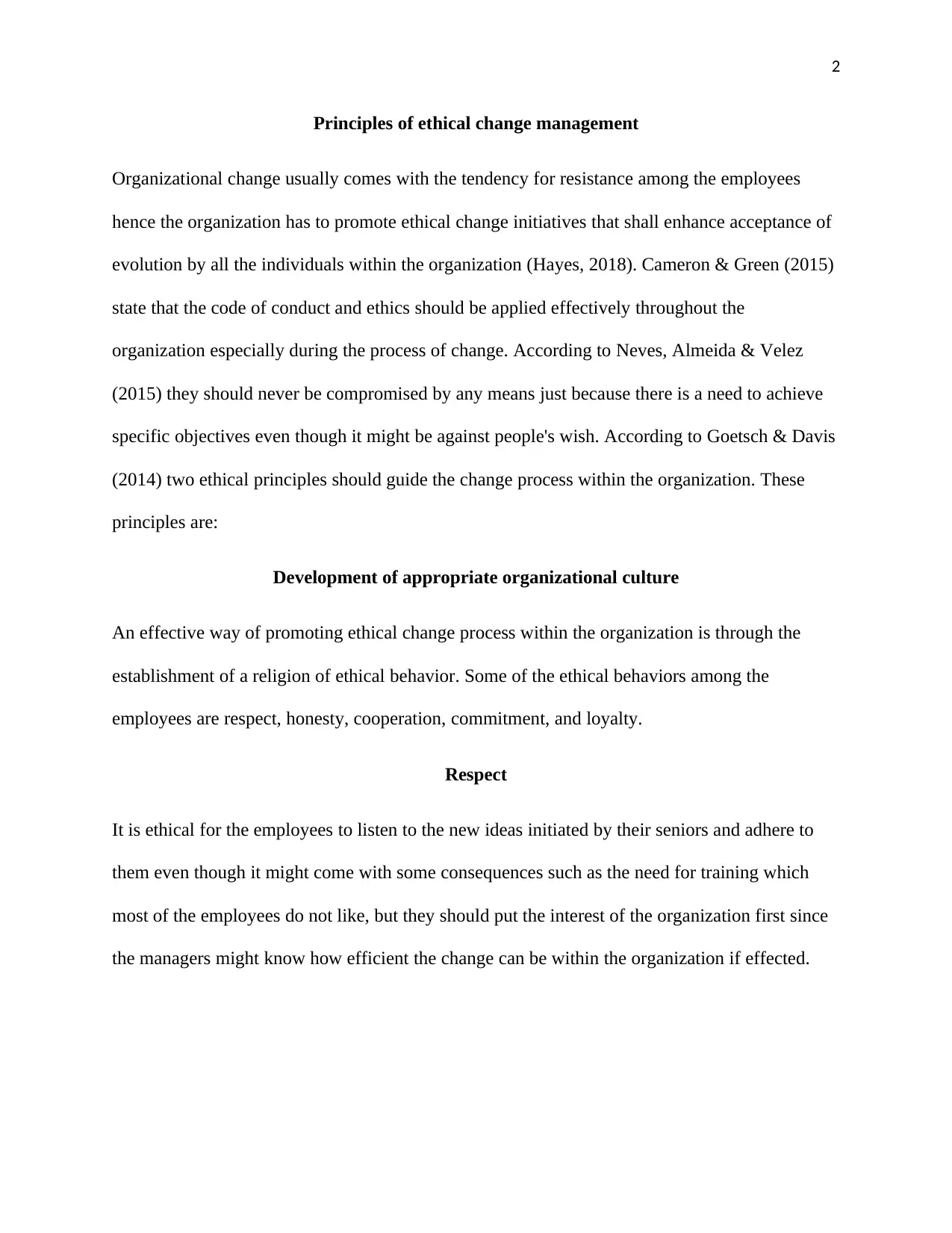
2
Principles of ethical change management
Organizational change usually comes with the tendency for resistance among the employees
hence the organization has to promote ethical change initiatives that shall enhance acceptance of
evolution by all the individuals within the organization (Hayes, 2018). Cameron & Green (2015)
state that the code of conduct and ethics should be applied effectively throughout the
organization especially during the process of change. According to Neves, Almeida & Velez
(2015) they should never be compromised by any means just because there is a need to achieve
specific objectives even though it might be against people's wish. According to Goetsch & Davis
(2014) two ethical principles should guide the change process within the organization. These
principles are:
Development of appropriate organizational culture
An effective way of promoting ethical change process within the organization is through the
establishment of a religion of ethical behavior. Some of the ethical behaviors among the
employees are respect, honesty, cooperation, commitment, and loyalty.
Respect
It is ethical for the employees to listen to the new ideas initiated by their seniors and adhere to
them even though it might come with some consequences such as the need for training which
most of the employees do not like, but they should put the interest of the organization first since
the managers might know how efficient the change can be within the organization if effected.
Principles of ethical change management
Organizational change usually comes with the tendency for resistance among the employees
hence the organization has to promote ethical change initiatives that shall enhance acceptance of
evolution by all the individuals within the organization (Hayes, 2018). Cameron & Green (2015)
state that the code of conduct and ethics should be applied effectively throughout the
organization especially during the process of change. According to Neves, Almeida & Velez
(2015) they should never be compromised by any means just because there is a need to achieve
specific objectives even though it might be against people's wish. According to Goetsch & Davis
(2014) two ethical principles should guide the change process within the organization. These
principles are:
Development of appropriate organizational culture
An effective way of promoting ethical change process within the organization is through the
establishment of a religion of ethical behavior. Some of the ethical behaviors among the
employees are respect, honesty, cooperation, commitment, and loyalty.
Respect
It is ethical for the employees to listen to the new ideas initiated by their seniors and adhere to
them even though it might come with some consequences such as the need for training which
most of the employees do not like, but they should put the interest of the organization first since
the managers might know how efficient the change can be within the organization if effected.
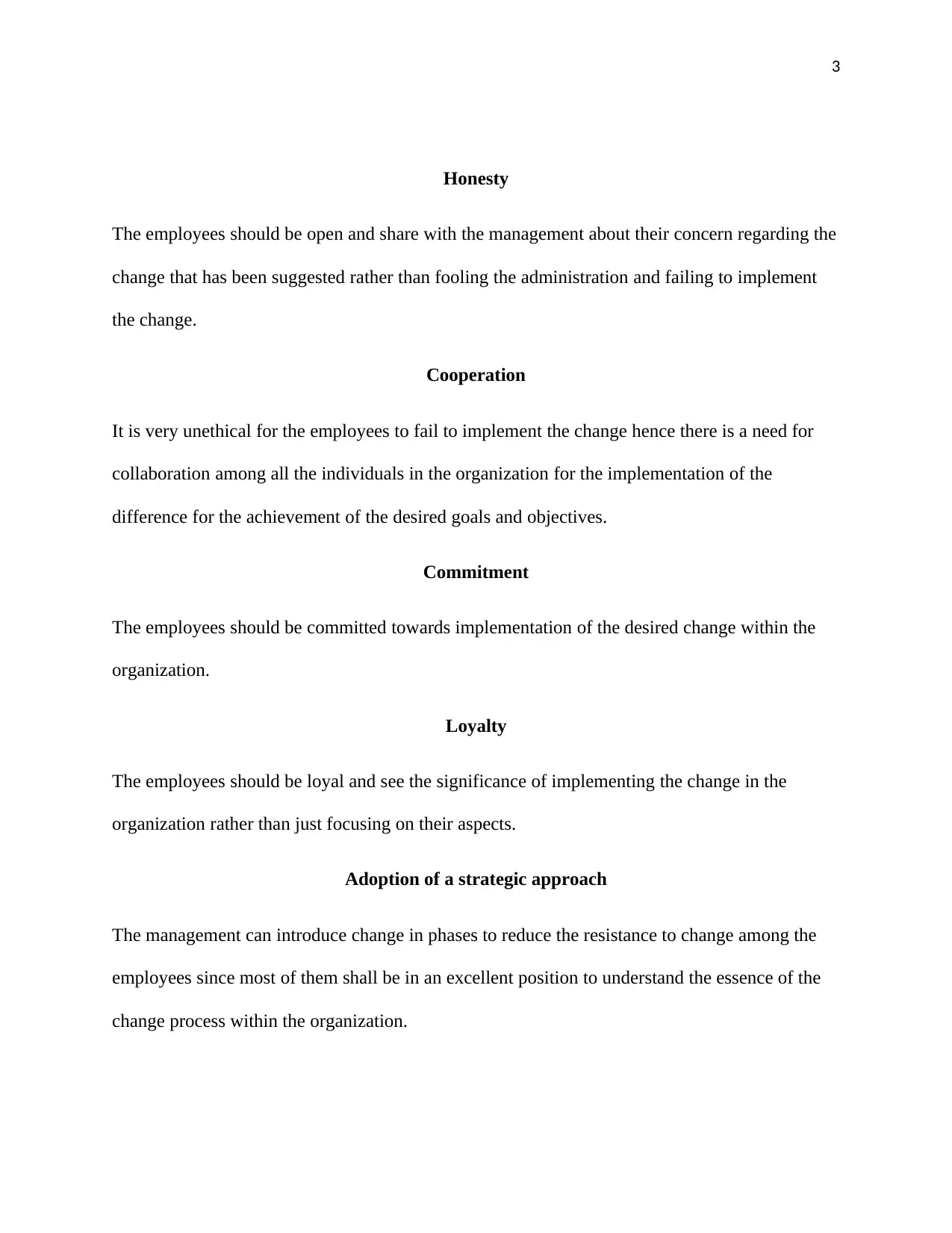
3
Honesty
The employees should be open and share with the management about their concern regarding the
change that has been suggested rather than fooling the administration and failing to implement
the change.
Cooperation
It is very unethical for the employees to fail to implement the change hence there is a need for
collaboration among all the individuals in the organization for the implementation of the
difference for the achievement of the desired goals and objectives.
Commitment
The employees should be committed towards implementation of the desired change within the
organization.
Loyalty
The employees should be loyal and see the significance of implementing the change in the
organization rather than just focusing on their aspects.
Adoption of a strategic approach
The management can introduce change in phases to reduce the resistance to change among the
employees since most of them shall be in an excellent position to understand the essence of the
change process within the organization.
Honesty
The employees should be open and share with the management about their concern regarding the
change that has been suggested rather than fooling the administration and failing to implement
the change.
Cooperation
It is very unethical for the employees to fail to implement the change hence there is a need for
collaboration among all the individuals in the organization for the implementation of the
difference for the achievement of the desired goals and objectives.
Commitment
The employees should be committed towards implementation of the desired change within the
organization.
Loyalty
The employees should be loyal and see the significance of implementing the change in the
organization rather than just focusing on their aspects.
Adoption of a strategic approach
The management can introduce change in phases to reduce the resistance to change among the
employees since most of them shall be in an excellent position to understand the essence of the
change process within the organization.
⊘ This is a preview!⊘
Do you want full access?
Subscribe today to unlock all pages.

Trusted by 1+ million students worldwide
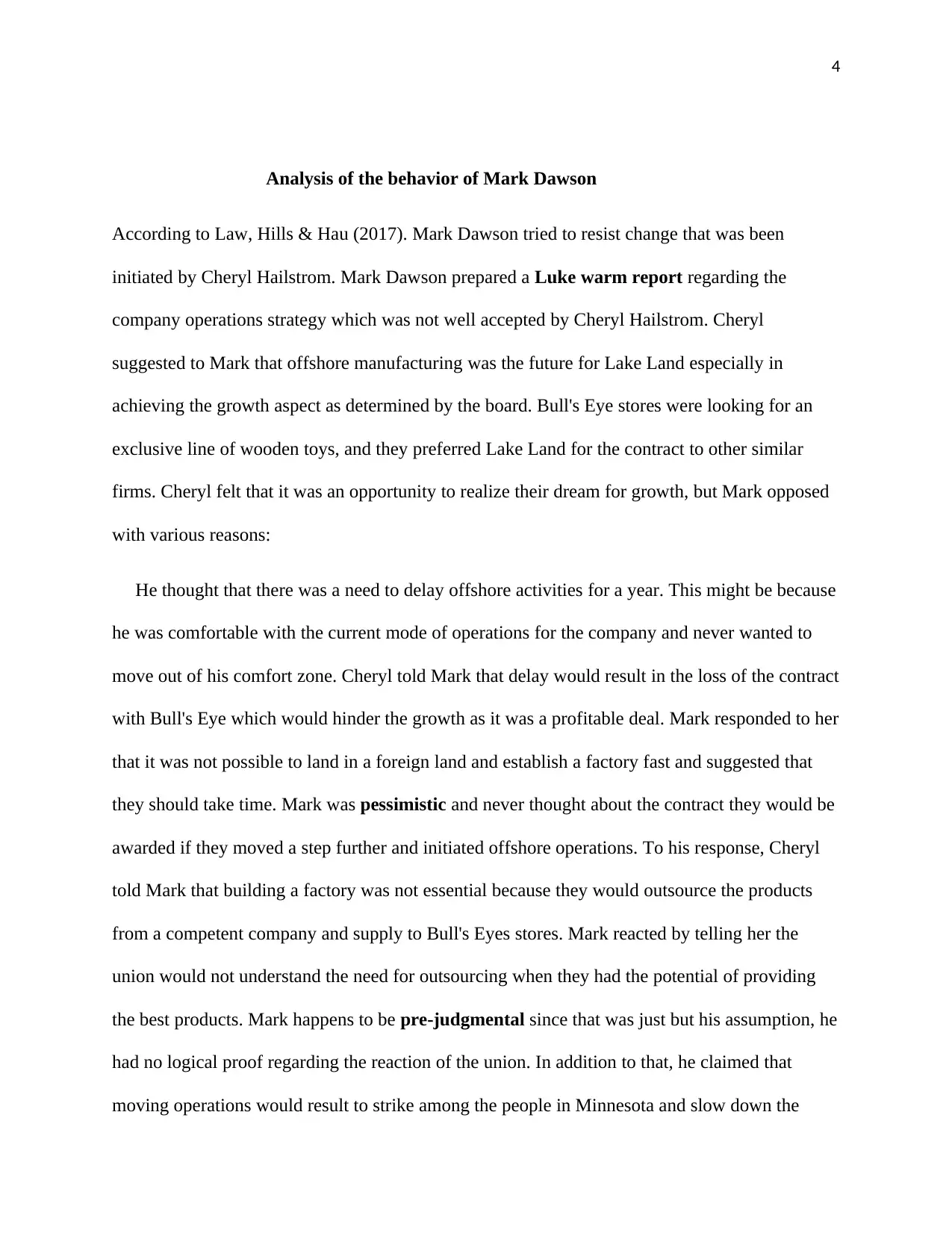
4
Analysis of the behavior of Mark Dawson
According to Law, Hills & Hau (2017). Mark Dawson tried to resist change that was been
initiated by Cheryl Hailstrom. Mark Dawson prepared a Luke warm report regarding the
company operations strategy which was not well accepted by Cheryl Hailstrom. Cheryl
suggested to Mark that offshore manufacturing was the future for Lake Land especially in
achieving the growth aspect as determined by the board. Bull's Eye stores were looking for an
exclusive line of wooden toys, and they preferred Lake Land for the contract to other similar
firms. Cheryl felt that it was an opportunity to realize their dream for growth, but Mark opposed
with various reasons:
He thought that there was a need to delay offshore activities for a year. This might be because
he was comfortable with the current mode of operations for the company and never wanted to
move out of his comfort zone. Cheryl told Mark that delay would result in the loss of the contract
with Bull's Eye which would hinder the growth as it was a profitable deal. Mark responded to her
that it was not possible to land in a foreign land and establish a factory fast and suggested that
they should take time. Mark was pessimistic and never thought about the contract they would be
awarded if they moved a step further and initiated offshore operations. To his response, Cheryl
told Mark that building a factory was not essential because they would outsource the products
from a competent company and supply to Bull's Eyes stores. Mark reacted by telling her the
union would not understand the need for outsourcing when they had the potential of providing
the best products. Mark happens to be pre-judgmental since that was just but his assumption, he
had no logical proof regarding the reaction of the union. In addition to that, he claimed that
moving operations would result to strike among the people in Minnesota and slow down the
Analysis of the behavior of Mark Dawson
According to Law, Hills & Hau (2017). Mark Dawson tried to resist change that was been
initiated by Cheryl Hailstrom. Mark Dawson prepared a Luke warm report regarding the
company operations strategy which was not well accepted by Cheryl Hailstrom. Cheryl
suggested to Mark that offshore manufacturing was the future for Lake Land especially in
achieving the growth aspect as determined by the board. Bull's Eye stores were looking for an
exclusive line of wooden toys, and they preferred Lake Land for the contract to other similar
firms. Cheryl felt that it was an opportunity to realize their dream for growth, but Mark opposed
with various reasons:
He thought that there was a need to delay offshore activities for a year. This might be because
he was comfortable with the current mode of operations for the company and never wanted to
move out of his comfort zone. Cheryl told Mark that delay would result in the loss of the contract
with Bull's Eye which would hinder the growth as it was a profitable deal. Mark responded to her
that it was not possible to land in a foreign land and establish a factory fast and suggested that
they should take time. Mark was pessimistic and never thought about the contract they would be
awarded if they moved a step further and initiated offshore operations. To his response, Cheryl
told Mark that building a factory was not essential because they would outsource the products
from a competent company and supply to Bull's Eyes stores. Mark reacted by telling her the
union would not understand the need for outsourcing when they had the potential of providing
the best products. Mark happens to be pre-judgmental since that was just but his assumption, he
had no logical proof regarding the reaction of the union. In addition to that, he claimed that
moving operations would result to strike among the people in Minnesota and slow down the
Paraphrase This Document
Need a fresh take? Get an instant paraphrase of this document with our AI Paraphraser
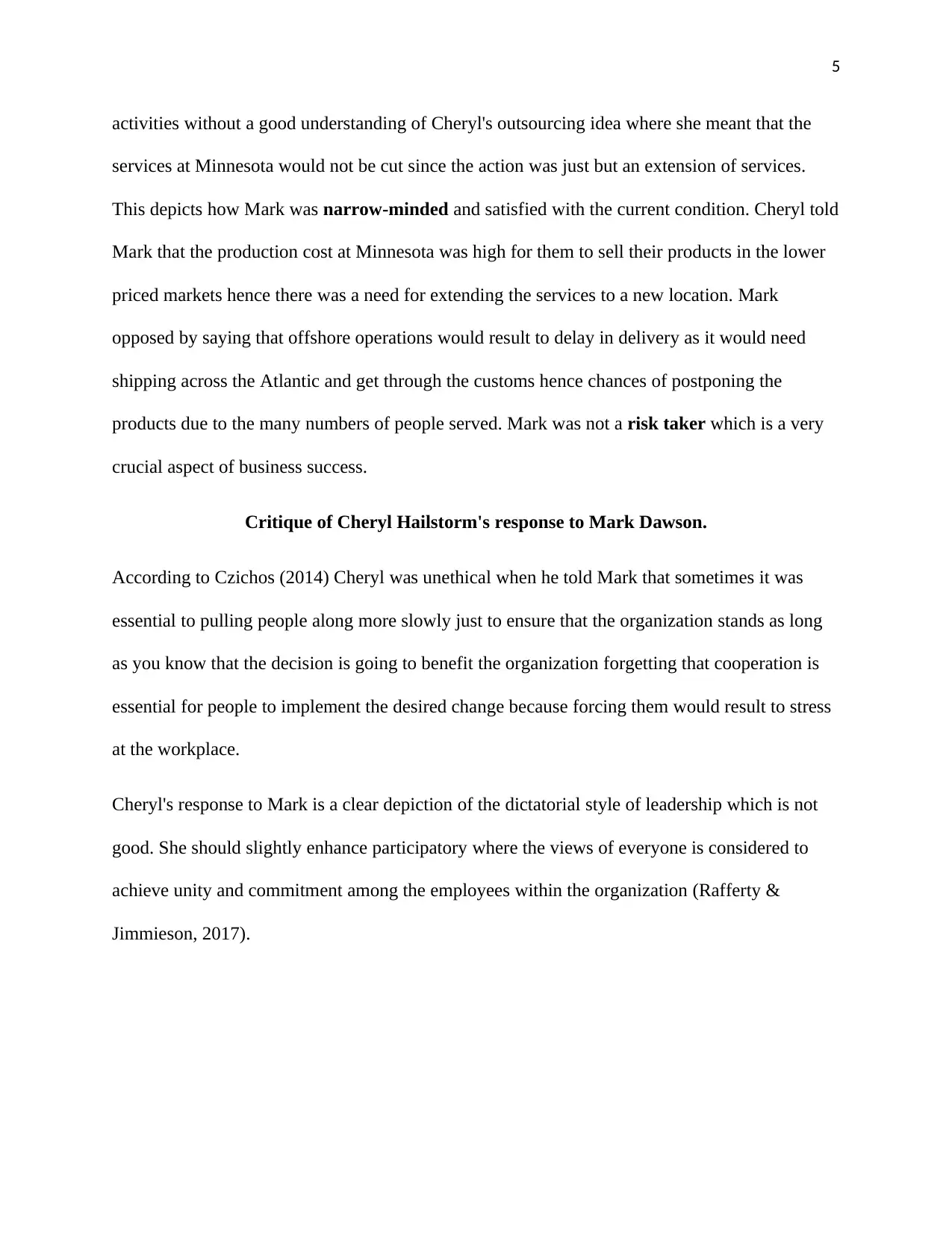
5
activities without a good understanding of Cheryl's outsourcing idea where she meant that the
services at Minnesota would not be cut since the action was just but an extension of services.
This depicts how Mark was narrow-minded and satisfied with the current condition. Cheryl told
Mark that the production cost at Minnesota was high for them to sell their products in the lower
priced markets hence there was a need for extending the services to a new location. Mark
opposed by saying that offshore operations would result to delay in delivery as it would need
shipping across the Atlantic and get through the customs hence chances of postponing the
products due to the many numbers of people served. Mark was not a risk taker which is a very
crucial aspect of business success.
Critique of Cheryl Hailstorm's response to Mark Dawson.
According to Czichos (2014) Cheryl was unethical when he told Mark that sometimes it was
essential to pulling people along more slowly just to ensure that the organization stands as long
as you know that the decision is going to benefit the organization forgetting that cooperation is
essential for people to implement the desired change because forcing them would result to stress
at the workplace.
Cheryl's response to Mark is a clear depiction of the dictatorial style of leadership which is not
good. She should slightly enhance participatory where the views of everyone is considered to
achieve unity and commitment among the employees within the organization (Rafferty &
Jimmieson, 2017).
activities without a good understanding of Cheryl's outsourcing idea where she meant that the
services at Minnesota would not be cut since the action was just but an extension of services.
This depicts how Mark was narrow-minded and satisfied with the current condition. Cheryl told
Mark that the production cost at Minnesota was high for them to sell their products in the lower
priced markets hence there was a need for extending the services to a new location. Mark
opposed by saying that offshore operations would result to delay in delivery as it would need
shipping across the Atlantic and get through the customs hence chances of postponing the
products due to the many numbers of people served. Mark was not a risk taker which is a very
crucial aspect of business success.
Critique of Cheryl Hailstorm's response to Mark Dawson.
According to Czichos (2014) Cheryl was unethical when he told Mark that sometimes it was
essential to pulling people along more slowly just to ensure that the organization stands as long
as you know that the decision is going to benefit the organization forgetting that cooperation is
essential for people to implement the desired change because forcing them would result to stress
at the workplace.
Cheryl's response to Mark is a clear depiction of the dictatorial style of leadership which is not
good. She should slightly enhance participatory where the views of everyone is considered to
achieve unity and commitment among the employees within the organization (Rafferty &
Jimmieson, 2017).
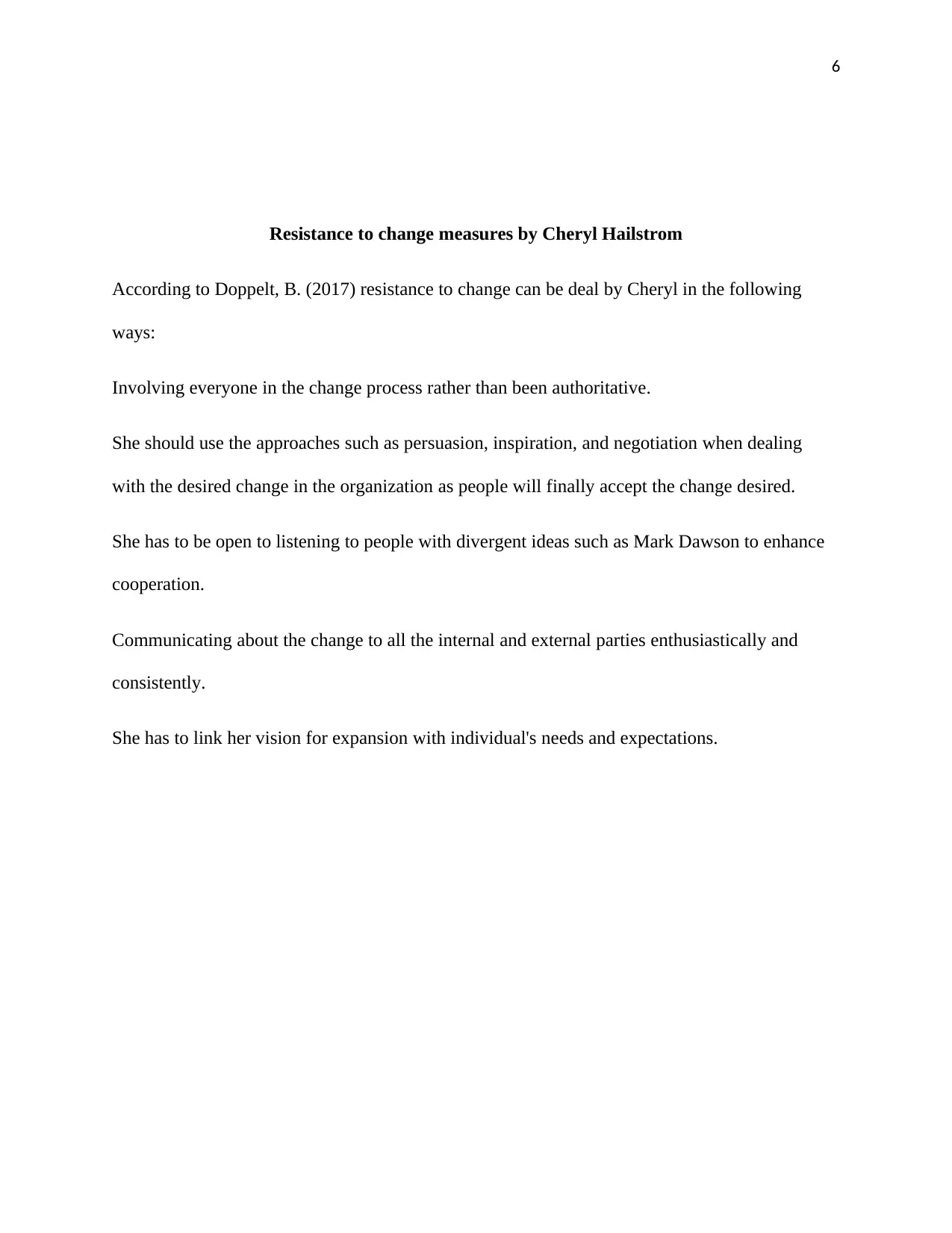
6
Resistance to change measures by Cheryl Hailstrom
According to Doppelt, B. (2017) resistance to change can be deal by Cheryl in the following
ways:
Involving everyone in the change process rather than been authoritative.
She should use the approaches such as persuasion, inspiration, and negotiation when dealing
with the desired change in the organization as people will finally accept the change desired.
She has to be open to listening to people with divergent ideas such as Mark Dawson to enhance
cooperation.
Communicating about the change to all the internal and external parties enthusiastically and
consistently.
She has to link her vision for expansion with individual's needs and expectations.
Resistance to change measures by Cheryl Hailstrom
According to Doppelt, B. (2017) resistance to change can be deal by Cheryl in the following
ways:
Involving everyone in the change process rather than been authoritative.
She should use the approaches such as persuasion, inspiration, and negotiation when dealing
with the desired change in the organization as people will finally accept the change desired.
She has to be open to listening to people with divergent ideas such as Mark Dawson to enhance
cooperation.
Communicating about the change to all the internal and external parties enthusiastically and
consistently.
She has to link her vision for expansion with individual's needs and expectations.
⊘ This is a preview!⊘
Do you want full access?
Subscribe today to unlock all pages.

Trusted by 1+ million students worldwide
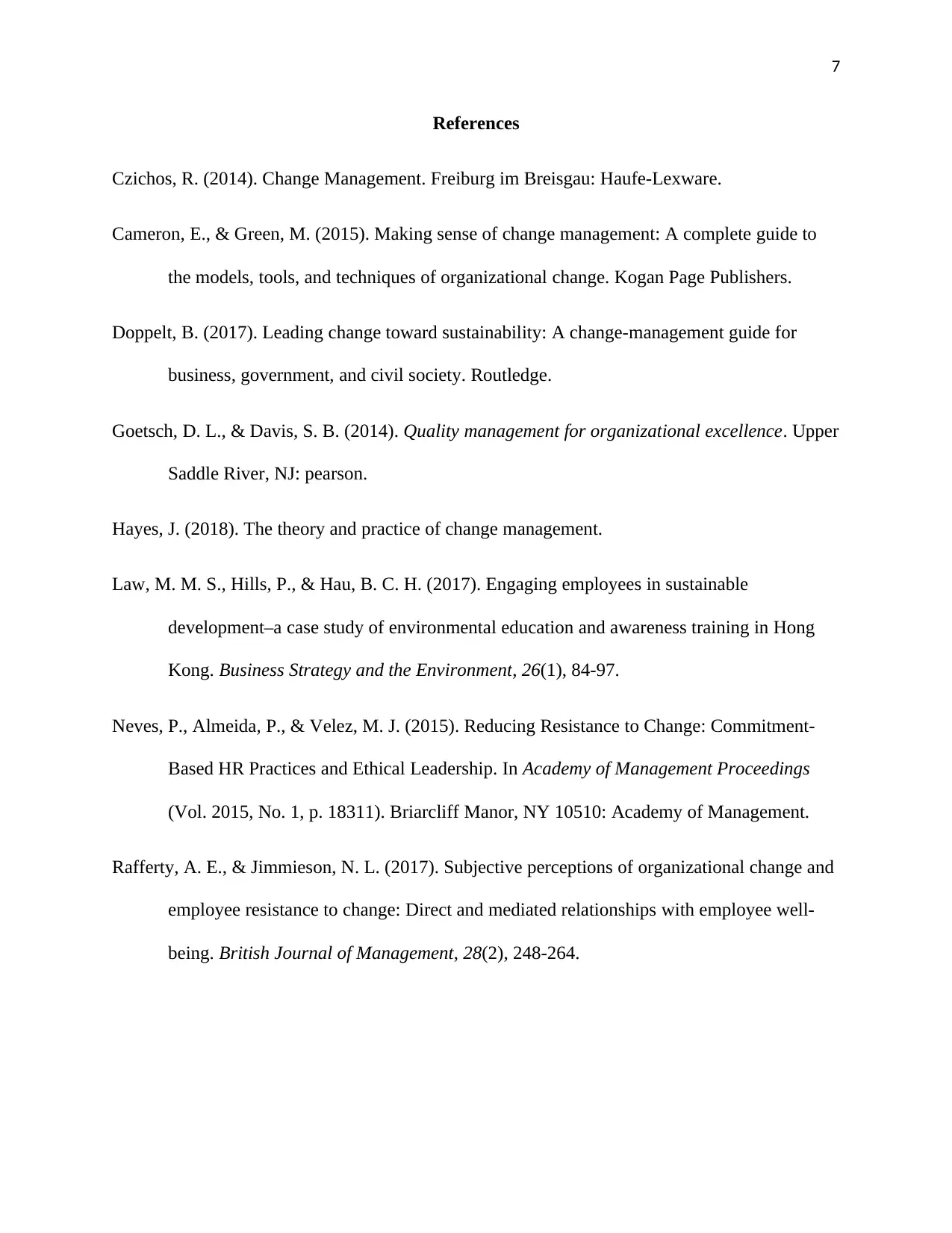
7
References
Czichos, R. (2014). Change Management. Freiburg im Breisgau: Haufe-Lexware.
Cameron, E., & Green, M. (2015). Making sense of change management: A complete guide to
the models, tools, and techniques of organizational change. Kogan Page Publishers.
Doppelt, B. (2017). Leading change toward sustainability: A change-management guide for
business, government, and civil society. Routledge.
Goetsch, D. L., & Davis, S. B. (2014). Quality management for organizational excellence. Upper
Saddle River, NJ: pearson.
Hayes, J. (2018). The theory and practice of change management.
Law, M. M. S., Hills, P., & Hau, B. C. H. (2017). Engaging employees in sustainable
development–a case study of environmental education and awareness training in Hong
Kong. Business Strategy and the Environment, 26(1), 84-97.
Neves, P., Almeida, P., & Velez, M. J. (2015). Reducing Resistance to Change: Commitment-
Based HR Practices and Ethical Leadership. In Academy of Management Proceedings
(Vol. 2015, No. 1, p. 18311). Briarcliff Manor, NY 10510: Academy of Management.
Rafferty, A. E., & Jimmieson, N. L. (2017). Subjective perceptions of organizational change and
employee resistance to change: Direct and mediated relationships with employee well‐
being. British Journal of Management, 28(2), 248-264.
References
Czichos, R. (2014). Change Management. Freiburg im Breisgau: Haufe-Lexware.
Cameron, E., & Green, M. (2015). Making sense of change management: A complete guide to
the models, tools, and techniques of organizational change. Kogan Page Publishers.
Doppelt, B. (2017). Leading change toward sustainability: A change-management guide for
business, government, and civil society. Routledge.
Goetsch, D. L., & Davis, S. B. (2014). Quality management for organizational excellence. Upper
Saddle River, NJ: pearson.
Hayes, J. (2018). The theory and practice of change management.
Law, M. M. S., Hills, P., & Hau, B. C. H. (2017). Engaging employees in sustainable
development–a case study of environmental education and awareness training in Hong
Kong. Business Strategy and the Environment, 26(1), 84-97.
Neves, P., Almeida, P., & Velez, M. J. (2015). Reducing Resistance to Change: Commitment-
Based HR Practices and Ethical Leadership. In Academy of Management Proceedings
(Vol. 2015, No. 1, p. 18311). Briarcliff Manor, NY 10510: Academy of Management.
Rafferty, A. E., & Jimmieson, N. L. (2017). Subjective perceptions of organizational change and
employee resistance to change: Direct and mediated relationships with employee well‐
being. British Journal of Management, 28(2), 248-264.
1 out of 7
Related Documents
Your All-in-One AI-Powered Toolkit for Academic Success.
+13062052269
info@desklib.com
Available 24*7 on WhatsApp / Email
![[object Object]](/_next/static/media/star-bottom.7253800d.svg)
Unlock your academic potential
Copyright © 2020–2025 A2Z Services. All Rights Reserved. Developed and managed by ZUCOL.




